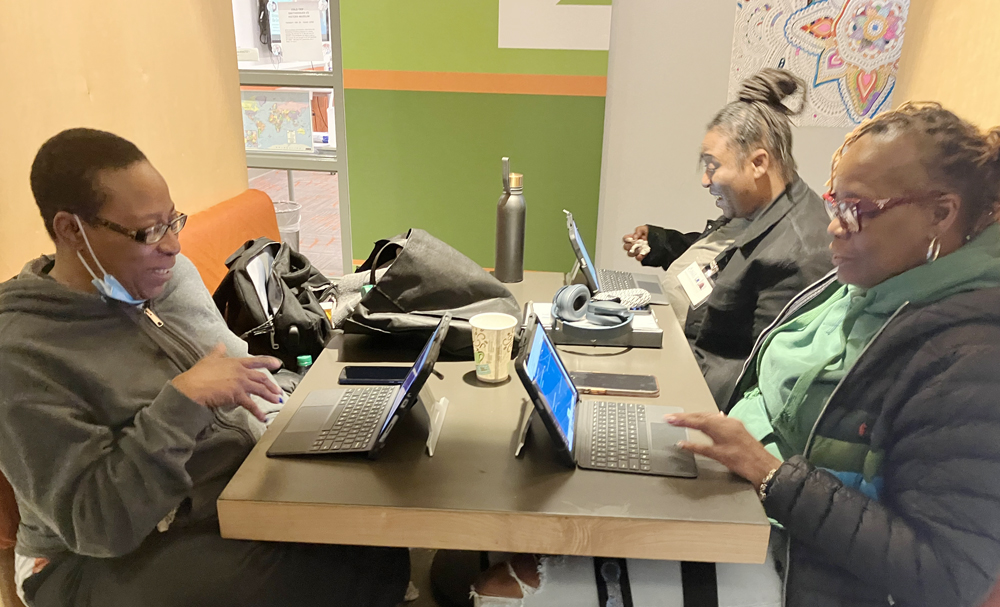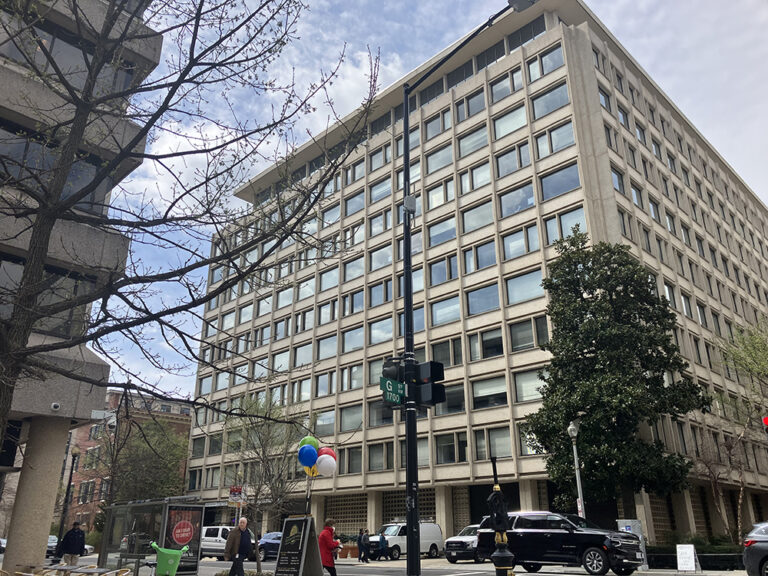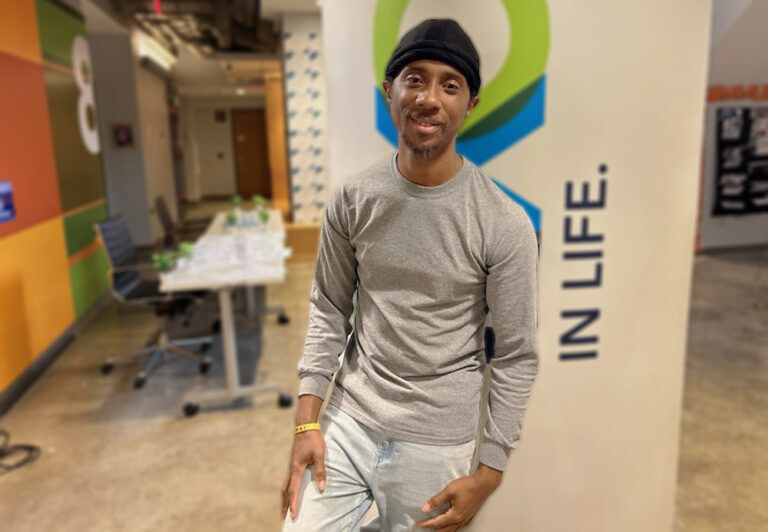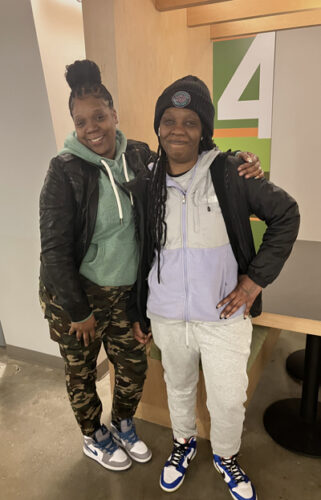This story first appeared at The 74, a nonprofit news site covering education. Sign up for free newsletters from The 74 to get more like this in your inbox.
In 2004, when he was 17, Michael Jeffery stole a patrolman’s badge out of a police cruiser in Plano, Texas. He admits it was a “dumb decision.” He’d dropped out of school in ninth grade and was in the habit of “car hopping” — breaking into vehicles to look for valuables.
Police arrested him quickly.
“They left me in jail,” he said. “And all I know [is] I went to court nine months later. I had a felony charge for something — I didn’t know what was going on.”
Nearly 20 years later, at 36, he’s about to enroll at Catholic University, where he plans to study law, saying, “I want to fight for myself.”
On July 14, he finally graduated from high school — as valedictorian, no less, a feat that seems all the more amazing because Jeffery has spent virtually all of his time in D.C., nearly two years, living in a tent near the city’s Navy Yard, showering at a neighborhood pool and riding a city bus 15 minutes to class.
He graduated thanks to an unusual program housed in a two-campus school with one mission: to help adults get their high school diploma, sometimes decades after they dropped out.
Its oldest graduate is 72 and the youngest 15. The average student, if there is one, is 28 years old.
The school gets its name and startup funding from the place where most of us shop for castoff Pyrex pans, old vinyl LPs and vintage T-shirts.

The Goodwill Excel Center Adult Charter High School is the only adult charter in the district that awards a real high school diploma rather than a GED. After seven years in operation, it boasts about 500 graduates, all of them searching for a second chance to prove to the world — and themselves — that they can succeed in school.
Excel does it by front-loading essential services and personalizing everything it can. Among its features: on-site childcare, free transportation to and from school and classes that meet just four days a week — Fridays are devoted almost exclusively to tutoring. And each student has an academic coach.
The typical class size is just 10 to 12 students, with many even smaller. It does all this, its leaders say, with the same level of funding that other D.C. charter high schools get: about $16,000 to $21,000 per student.
“People know your name, know your story — and then your coach is your main person,” said Chelsea Kirk, the schools’ executive director, who calls the approach “curated” to the students it serves.
The individualized approach is intentional, designed to reframe the task of high school completion.
“We like to put high school dropouts into a box and say, ‘This is why they’re a dropout,’” Kirk said. “But we don’t ever think about what structures caused that. We don’t ever think about ‘How could a school change its structures to embrace people?’”
Like Jeffery, many graduates push to get their diplomas because they want to work as attorneys, social workers and the like, devoting their lives to changing the “poor service and broken systems” they’ve experienced in school and elsewhere as they looked for help.
Doing it for someone
Many Excel students push for their high school diploma because not having it is holding them back from promotions and higher salaries. One alumnus told the school he worked as a paralegal at the same law firm for 18 years, earning minimum wage. A diploma bumped his salary by $20,000.
But for others, the reasons are highly personal. Carla Thompson, 41, said she made her way to Excel after one of her four children, ages 9 to 21, began asking about the point of finishing high school instead of dropping out and getting a job.
“My 14-year-old is questioning that part,” she said. “I can’t be a hypocrite and say, ‘You have to,’ and I don’t have it.”
Crushed by negative news?
Sign up for the Reasons to be Cheerful newsletter.Brendan Hurley, who handles public affairs for the D.C.-area Goodwill region, said messaging for the school has adjusted to this reality. When the school opened in 2016, recruiting materials were “very data driven,” with statistics on how much more high school graduates earn and how they’re more likely to find sustainable employment. Two years in, an alumni focus group found that message paled in comparison to the blush of pride students felt from simply getting the diploma and sharing the accomplishment with their loved ones.
“It’s the diploma itself that’s important,” said Hurley. “They want that piece of paper. They want the high school experience that they did not have when they were 16, 17, 18 years old.”
The big prize, Kirk added, is the external validation they get, the ability to hold their head up among their children and grandchildren. She calls it a “two-generation” approach. “It’s not just about you. It’s about the next generation and a generation after that.”
‘Small wins’
The Excel model originated in Indiana in 2010, when Goodwill centers there struggled to find high school graduates to be front-line store workers. It has since spread to five states and D.C.
The approach takes hold at a moment when U.S. high school graduation rates, while never higher at 86 percent, are unequally distributed. In fact, D.C. has the worst graduation rate in the nation, at 69 percent, far below even the worst two states, New Mexico and Arizona.
In D.C., enrollment in the two campuses now sits at 405, with a planned, separately privately funded campus in Baltimore this fall as well. The student body is overwhelmingly Black and about 70 percent female. For these students, the schools maintain a full-time staff of 49 — many of them younger than the students they serve.
Discussions with Goodwill about opening the center began in 2014, when it got a grant from D.C. to train employees at a planned Marriott hotel. But they found that the No. 1 barrier to jobs at the hotel was a lack of high school diploma. The school opened two years later among the corporate and government highrise canyons just north of The White House. Another campus opened last year near D.C.’s National Mall.

Though most Excel students come from the poorest neighborhoods in the city, miles from downtown, the schools’ geography is intentional, Kirk said: Students wanted safe locations away from the crime and violent schools of their neighborhoods. But they also wanted a place that brought them into contact each morning with professional opportunities. As it is, the original school lies squarely between the World Bank and the Council on Foreign Relations.
One key to the school’s success is its prioritization of “small wins” for students who may have had few of them in school until now. For instance, a big difference between Excel and virtually every other school model is its academic calendar. No matter what their education or skill level when they enter, every student starts as a ninth-grader and proceeds at her own pace, without a cohort of classmates on the same track.
Students ideally can complete their entire high school education in just two years, with individualized education plans and tutoring for every student that allow them to maintain work and family duties. In reality, many students complete the program more slowly, coming and going as life allows — a few who graduated this July first enrolled in 2016, when the center’s doors opened.
The school licenses with the local YMCA to run a full-time, licensed daycare and child development center upstairs from the classrooms.
And instead of 20-week semesters, as in most high schools, Excel offers all its courses in five compact eight-week terms, all of them based on competency, not seat time. Four assessments over the course of each term keep students on track.
But if they lose the thread of a course and tutoring doesn’t help, they can simply start over again at the end of eight weeks, without having to wait months or even a year for a “re-do,” a major pain point for many students who drop out.
For students with heavy work or family commitments, the school offers a nearly unheard-of accommodation: Staying enrolled requires taking just one class per term.

Jeffery, the valedictorian, showed up to the school in the spring of 2022, after years of bouncing between jobs: dental assistant, tax preparer, fast-food restaurant manager.
“I can get a job without a high school diploma,” he said. “I have experience. I know I could have probably come out here and got a job that pays well with my resume. But that wasn’t my plan. My plan was to do more with myself because I know I can do more.”
He was ready to get on with his schoolwork: “I told them just to fill my schedule up, give me all the classes I can take.” He graduated barely a year after he started.
With the school’s help, he’s close to moving into his own place, if a background check clears. But he acknowledges that he’s spent a lot of time “lost, trying to find my way.”
By Jeffery’s telling, upon his arrest in Texas in 2004, authorities offered this deal: Plead guilty to felony assault stemming from a fight at a nearby high school and walk away with time served plus probation. Or risk going to trial for the fight and serve as much as eight years in prison. Because he was a juvenile, the records remain sealed.
He’d been at the school the night of the fight, but nowhere near the clash, he said — and he hadn’t even been questioned about it while sitting in jail for months. But he soon realized he had no choice: With a public defender who did little to stand up for him, Jeffery said, he took the plea deal and earned his release shortly after his 18th birthday.
“I didn’t know how the system worked,” he recalled, the ordeal still stinging nearly two decades later. “The lawyer that I had, and the judge, they didn’t fight for me. They didn’t care. They just wanted to get a conviction and call it a day.”
For the past year or so, Jeffery’s been known to spend more time than most at the school’s downtown campus, arriving early and leaving late, ferreting out the teachers who can offer a bit of extra tutoring. He made a point to get to know every teacher and administrator, lingering over conversations before heading back to his tent.
“Those cold nights and those hot summers and those rainy days and those rats, those people who are under the influence of all kinds, they’re not fun to live around,” he said. The school was “my escape from that world.”
‘I came in like a sour lemon’
The school follows 12 accountability goals set by D.C.’s Public Charter School Board. One of them requires Excel to graduate 20 percent to 25 percent of its students each year, which it typically does. According to its 2019 school quality report, it graduated 31.7 percent and exceeded the board’s reading and math proficiency goals. In 2022, it graduated 25 percent; this year that dropped to 22 percent, still meeting the board’s goals.
Its annual attendance goal: 60 percent, but the school adjusts to students’ lives if they show a willingness to persevere and be honest when they can’t make it to class. If students have two consecutive absences, the school requests that they create an attendance plan with their academic coach. Students can be kicked out if they don’t meet the requirements, but can easily reapply.
Many students, Kirk said, work overnight jobs and care for children and grandchildren, as well as parents. And many, approaching and in some cases exceeding middle age, have health issues that keep them away.
“We don’t take it lightly that you show up,” she said.
Cheryl Smith, 49, enrolled at Excel 33 years after leaving her D.C. middle school at the end of eighth grade — and a year after beating a lifelong PCP addiction, one that began around the time she dropped out of school. An adoptee who never met her biological parents, Smith had children of her own very young. She eventually had three kids, all before turning 20.
She can count the number of times she tried to quit PCP: 35. Her addiction tore her family apart. Her two sons would eventually be put up for adoption, but she stayed connected to them through a friend and has once more become a steady presence in their lives. Her kids all grew up, and she’s now a grandmother of eight.

She enrolled in 2021, recalling, “When I came here, they opened up their arms to me. I came in like a sour lemon, but rose to be an apple.”
For Smith, getting her diploma amounts to a kind of redemption and face-saving for her grandkids, the oldest of which is now 16, who spent their lives seeing their grandmother get high.
“The older ones knew,” she said. Though she never used drugs around her grandkids, they all saw the aftermath: “sitting there, looking stupid.”
She tried to get clean one last time, saying to herself: “I’m just tired of it. It’s not a good look.”
She had extra motivation: The birth of her youngest grandson Dontae, now three. Born premature, at just 2 pounds 11 ounces, the size of your hand, “he came out eating,” Smith said, thus earning the nickname Munchy.
Now in her care much of the time, he’d come to school with her most mornings, spending his days in the YMCA childcare center upstairs. Growing up in D.C., she said, he’ll undoubtedly see drug use around him. But not from his grandma.
Positive affirmation
In the end, the secret of the school’s success may boil down to the simplest of principles: It believes in its students. Ask any Excel student what they missed in their high school career and they’ll easily tell you: a sense of possibility, of success.
“That’s the piece that a lot of our students have missed, that affirmation piece, that ‘Atta boy,’” said Vershaun Terry, who heads special education for the schools. “They want to be seen.”
Many observers might mistakenly believe that positive affirmations are only for small children. Even prospective staffers at the school believe they’re walking into a space where adults can succeed without a lot of affirmation, Terry said.
“They don’t. They come in chronologically at a higher age, but socially, emotionally, they’re youth,” he said. Many still need that guidance, those affirmations, that structure. “They have a whole world out there to take care of, but they still need it here. They need to get refilled here, too.”
As for Cheryl Smith, she graduated alongside Jeffery and 54 others, 35 years after she finished middle school. She has told Kirk she wants to mentor students at Excel, but for now she’s grateful for the opportunity to be a role model after all these years. Next she wants to get off disability and find a home that’s not Section 8 public housing.
“I’ll be 50 next year,” she said. “When I get older, I want to be able to sit back in my rocking chair with my great-grandkids and be able to tell the story: ‘Yeah, Grandma was a pistol, but she turned out to be a winner.’ ”
This story was produced by The 74, a nonprofit, independent news organization focused on education in America.








